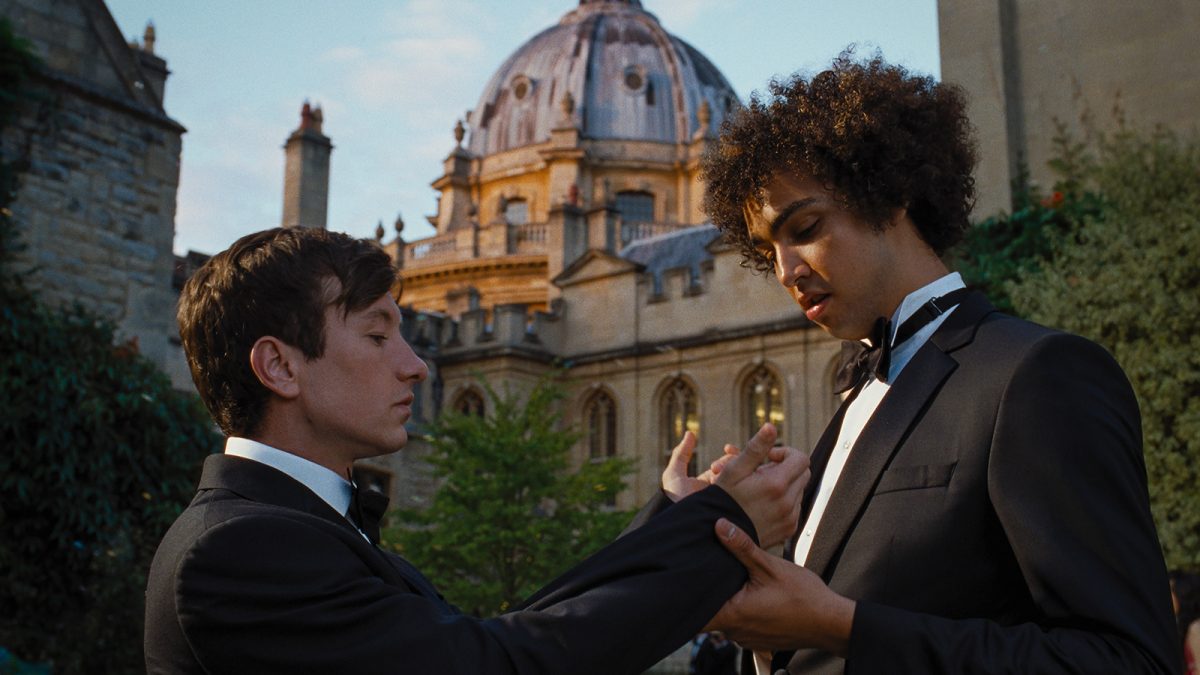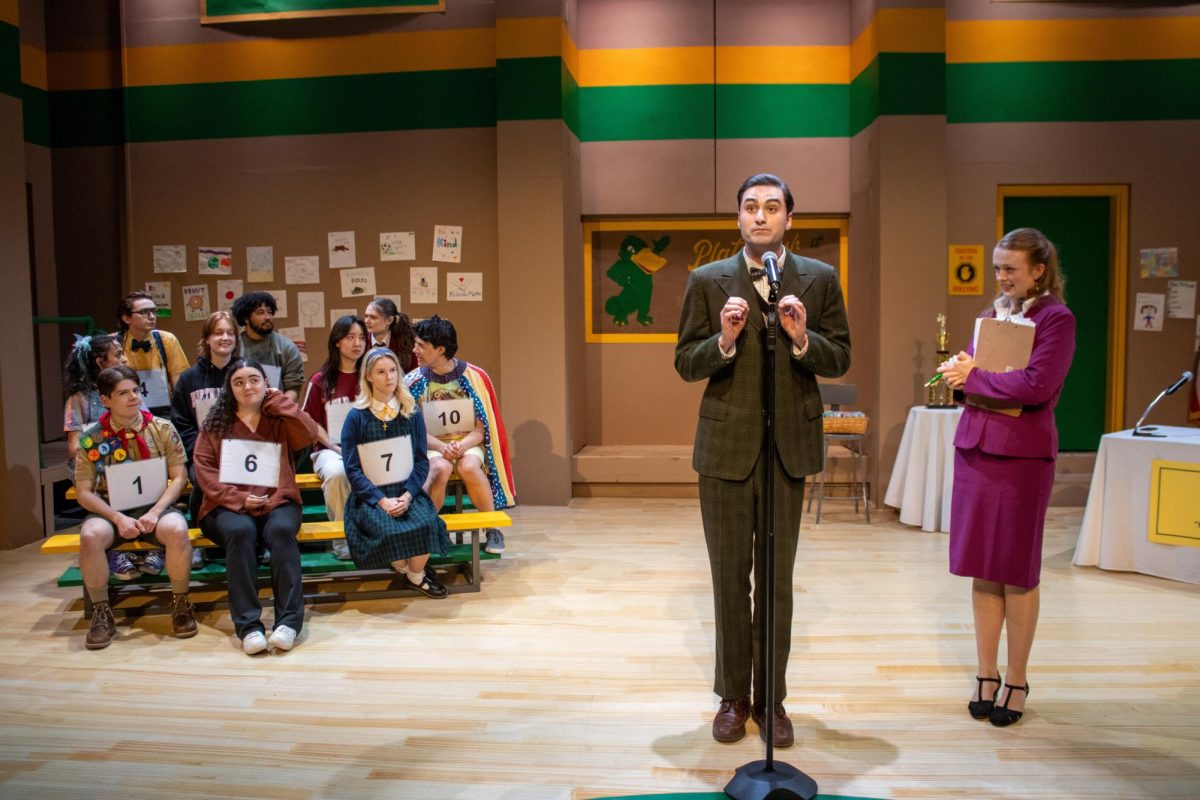For an Academy Award-winning screenwriter, Emerald Fennell sure doesn’t know how to pen a compelling third act.
Three years after the ending of “Promising Young Woman” left a bad taste in some viewers’ mouths, the British filmmaker has returned with her sophomore feature “Saltburn,” a well-acted and technically marvelous film woefully undercut by a muddled, poorly-paced screenplay that crescendos into unintended hilarity by its end.
Set in the late 2000s, the Metro-Goldwyn-Mayer release follows Oliver Quick (Barry Keoghan), a brilliant and seemingly impoverished young man who soon becomes obsessed with the affluent and effortlessly cool Felix Catton (Jacob Elordi) while studying at Oxford University. When Oliver reveals his desire to go anywhere but home for the summer holiday, Felix insists he stay with him and his family at their lavish abode, dubbed “Saltburn.”
What follows is a series of twists and turns that, though frequently provocative — an audience isn’t ordinarily subjected to footage of someone licking seminal fluid from a draining bathtub or performing oral sex on a menstruating woman, after all — never truly satisfy, serving instead as brief, cringe-inducing episodes that quickly fade from memory.
These moments — which, beyond altering the trajectory of the narrative and characters’ arcs, rarely leave an impact or feel earned — make it difficult to discern what Fennell’s going for. What starts as a homoerotic thriller à la “The Talented Mr. Ripley” soon morphs into a thinly veiled “eat the rich” black comedy before ending as an odd condemnation of the middle class — a cautionary tale for the elites about the supposed dangers of welcoming less fortunate individuals into their lives.
Given how convoluted Fennell’s story is, it comes as no surprise that becoming invested in it is a near impossibility, resulting in a plodding film that viewers are likely to grow tired of — especially after the death of a key character during Oliver’s lavish birthday bash at Saltburn, which makes the two-hour film feel longer than it is.
That said, Fennell’s script isn’t all bad. Her dialogue, for instance, is quite witty, culminating in several laugh-out-loud exchanges. One particularly riotous conversation sees Oliver and Elspeth Catton (Rosamund Pike), Felix’s prim-and-proper mother, discuss the latter’s experimentation with women while in college.
“I was a lesbian for a while, you know, but it was all a bit too wet for me in the end,” Elspeth remarks. “Men are so lovely and dry.”
Lines such as these, however, are only as good as those uttering them. Fortunately, the movie’s cast — particularly Keoghan, Elordi and Pike — are all excellent, elevating Fennell’s largely baffling picture from unbearable to entertaining enough.
Keoghan, renowned for playing socially inept weirdos in “The Killing of a Sacred Deer” and “The Banshees of Inisherin,” amongst others, excels as Oliver, fully exhibiting the character’s deranged psyche, especially in the film’s final moments, which feature full-frontal nudity — a sign of his commitment to the role.
Elordi, who is slowly but surely erasing “The Kissing Booth” movies from audiences’ collective memory thanks to his turns here and in Sofia Coppola’s “Priscilla,” sells Felix’s irresistibility, radiating charm and sex appeal throughout.
Finally, Pike — who, alongside Keoghan, earned a Golden Globe nomination for her performance — is absolutely hysterical as Elspeth, delivering lines with a deadpan disposition and feigning empathy for those around her, such as “Poor Dear” Pamela (Carey Mulligan), another guest at the estate who has long overstayed her welcome.
Further bolstering “Saltburn” are the contributions of “La La Land” cinematographer Linus Sandgren. He ensures that even when the film itself lulls (which is unfortunately often), there is something worth watching, capturing the sprawling estate’s ornate details in stunning long takes, the contours of characters’ faces in sumptuously lit close-ups and Oliver’s duplicity through shots taking advantage of mirrors and other reflective surfaces.
However, the decision to use a 1.33:1 aspect ratio is somewhat suspect. Though it does convey how everyone at the estate is constricted by upper-class norms, with everyone trapped inside a tight, square frame, it simultaneously obfuscates much of the locale’s grandeur. With this in mind, the adoption of a wider aspect ratio — or perhaps a fluctuation between the existing one and something more rectangular — could have been beneficial.
Enjoyment of the movie, then, is predominantly predicated on the willingness to forgive Fennell’s uneven screenplay. For those bookmarking fancam edits of Elordi and Keoghan — from their work in this film or others — across social media, this task is an easy one to surmount, making the actress-turned-director’s latest outing one worthy of multiple viewings. For everyone else, though, a single trip to “Saltburn” will likely do.

















